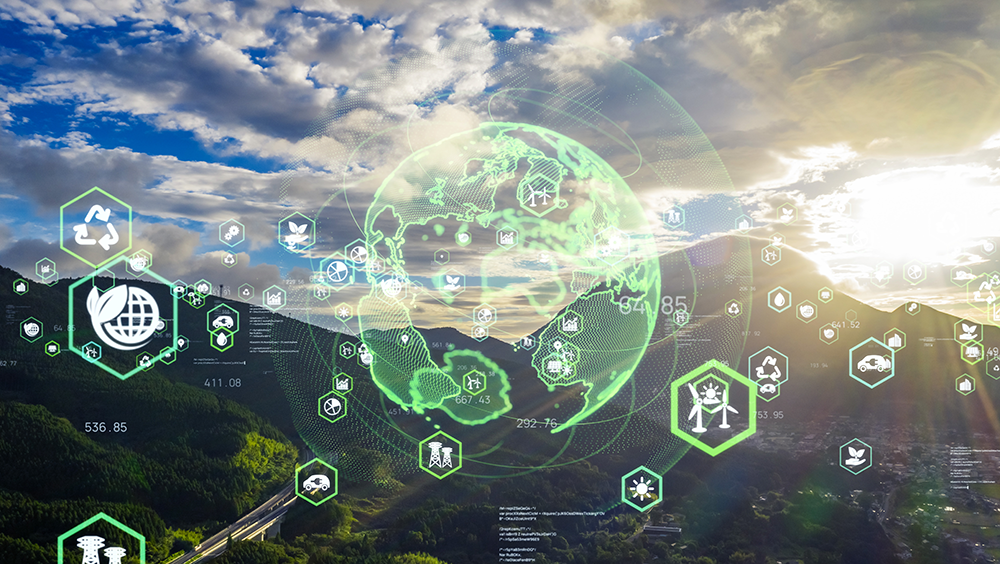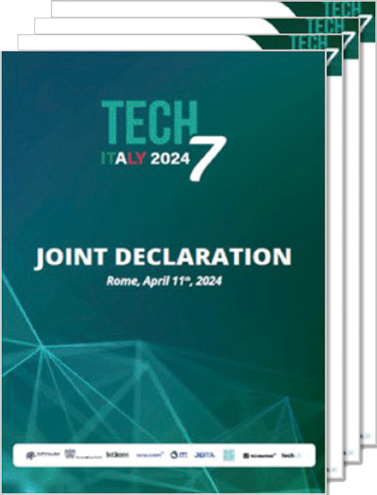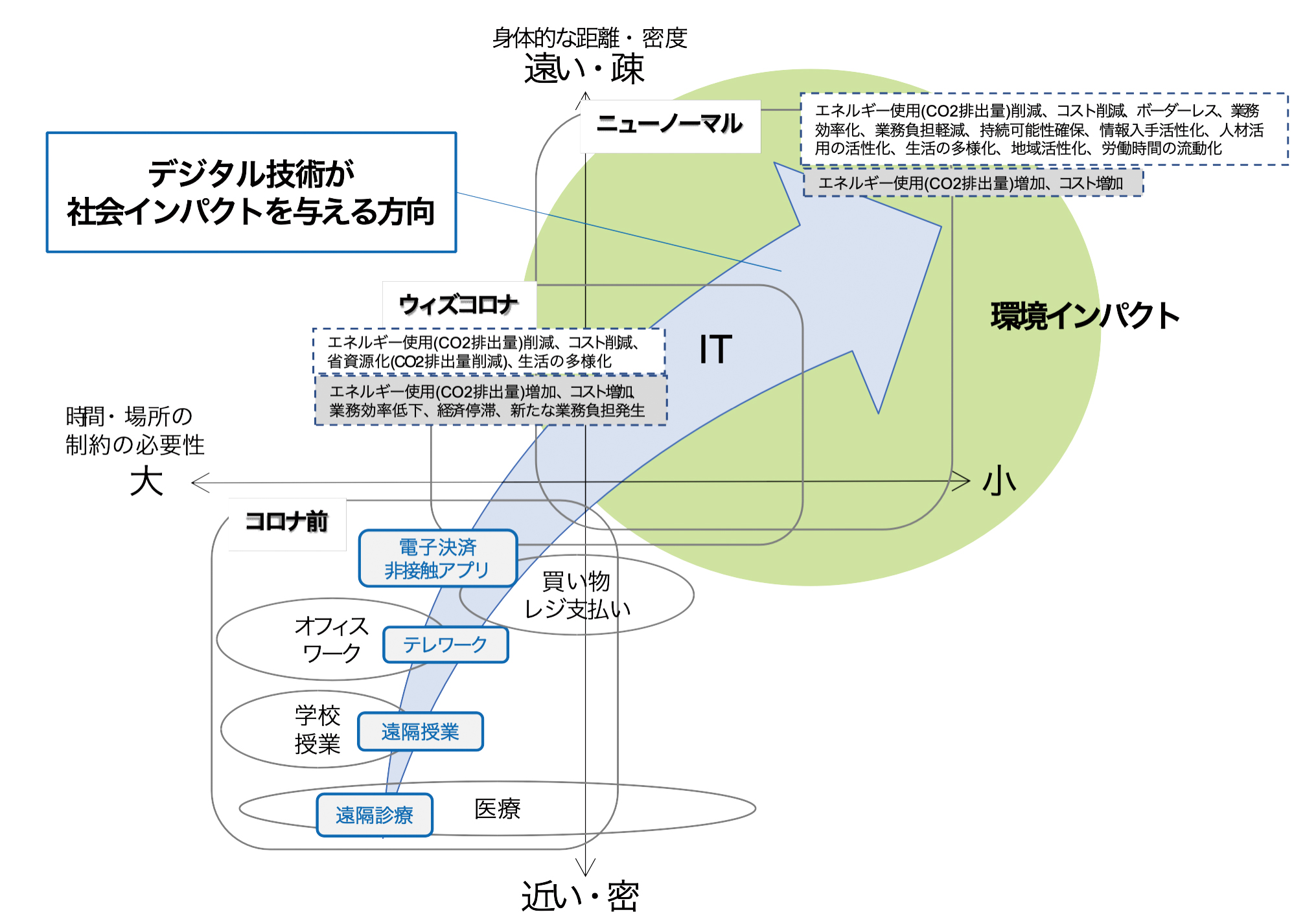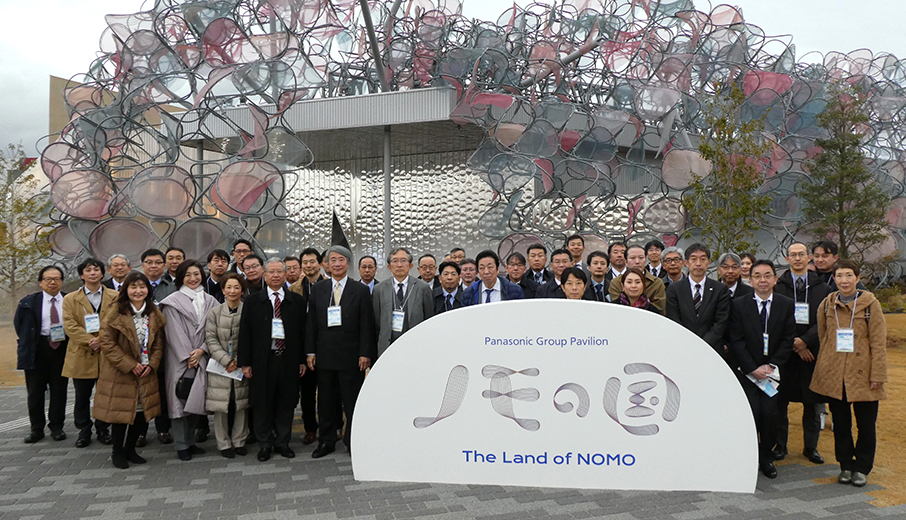Problem Solving
Efforts to meet social demands and solve common industry issues
Realizing Society 5.0 will require improving the business environment and resolving common issues. JEITA continues to engage proactively with industry-wide and other issues so as to enhance the competitiveness of member companies and fulfill our industry’s social responsibilities.
The business environment needs to be enhanced to realize new economic growth driven by green digital technologies. Through the Green x Digital Consortium, JEITA will work to realize carbon neutrality throughout the supply chain, such as using digital technologies to save energy and visualize greenhouse gas emissions and expanding renewable energy use. We will also be proactive in presenting proposals on the shape of new markets.

JEITA has created “Responsible Business Conduct Guidelines” aimed at promoting CSR in our industries’ supply chains and released self-assessment sheets based on these, as well as regularly engaging in joint supplier education and awareness-raising activities.

JEITA is committed to creating an environment conducive to the advance of the digital economy and greater international competitiveness, including preventing the spread of localization demands, cross-border data regulations, and other digital protectionism that could obstruct free corporate activities such as the creation of new services and innovation. To realize international rules on “Data Free Flow with Trust” (DFFT), industries in Japan, the United Kingdom, the United States, Europe, and beyond are working together to build consensus toward digital liberalization at the G7, G20, OECD and other international frameworks, starting with the WTO negotiations on a joint initiative on e-commerce. JEITA will engage in the necessary measures to prevent the spread of protectionist policies adopted on the grounds of geopolitical risk and economic security, working to reduce their impact on global business. We will also address issues in global logistics and seek to realize efficient, internationally competitive global supply chains.
In April 2024, the digital industries in the G7 countries released a joint declaration addressed to the G7 governments.

JEITA participates actively in the activities of international standardization organizations such as the IEC and ISO, providing international chairs, secretaries, or deputy secretaries in 25 cases, and acting as the domestic review organization entrusted with handling domestic deliberations for 36 TCs and SCs (TAs and JTC1). In addition to ongoing work in those product areas for which JEITA is responsible, we are also engaged in developing international standards in new areas such as printed electronics (IEC TC119), which will provide the base technologies for realizing IoT societies, and wearable electronics (IEC TC124), which are expected to have applications in a wide range of areas as devices essential to the integration of people and the Internet as IoT societies advance. The IEC is actively engaged in developing systems standards such as SyC AAL (Active Assisted Living), and JEITA is also working with relevant associations in areas such as the newly established SyC Smart Manufacturing. Now that a subcommittee on artificial intelligence, SC42, has been established under JTC1, which is jointly administered by the ISO and the IEC, JEITA participates actively in a committee steered by the Information Processing Society of Japan as the domestic review organization in this area. In conjunction with our participation in international standardization activities, JEITA is also pursuing the development of domestic standards. We have published more than 500 JEITA specifications for those areas for which we are responsible, as well as working to develop the Japanese Industrial Standards required by industry.
Efforts to resolve environment-related challenges are accelerating in Japan, in other countries, and at the global level, with reference also to industry policy. Key areas include climate change countermeasures, chemical substance management, the formation of a zero-waste society, and biodiversity protection. Taking these trends as opportunities for growth, we are making use of JEITA’s domestic and international networks to engage in appropriate responses. We are also working to position the electronics industry which JEITA represents as the driver of a virtuous cycle of economic growth and green solutions, linking these efforts organically to the exploration of the role of digital technologies in establishing a sustainable society, which needs to be deepened down the lines of sustainability and the SDGs, environmental measures included.
JEITA is utilizing the results of activities to date to foreground in Japan and abroad the way in which digital solutions contribute to resolving environmental and social issues such as carbon neutrality.

Amidst the digitization of society, there is a concern that the traditional format of Japanese education may not be equipping students with the capacities and skills that the world requires. The COVID pandemic, meanwhile, has normalized telework and communication via online systems, highlighting new communication issues. Having operated various education programs for educational institutions from elementary through tertiary level through industry-university partnership, JEITA is now taking on new challenges such as online classes and remote lab work. We will continue to seize various opportunities to develop a diverse range of human resources, working with the ‘digital native’ generation to build a comfortable and secure future.
With IoT permeating all areas of society, various types of machinery are now connected to the Internet. As a result, there are a growing number of machines with insufficient security or which are used with insufficient security awareness, creating gateways for information leaks and cyberattacks. JEITA regards cybersecurity for IoT machinery as a key issue for industry as a whole and is engaged in various initiatives related to machinery features and criticality, international partnership, and voluntary industry rules. Particularly in the strong growth area of smart homes, JEITA is working with related government agencies to establish security requirements for consumer IoT products geared to the government’s security labelling system JC-STAR. We aim to increase public awareness of the system and conduct in-depth investigations so as to ensure residents’ safety and peace of mind.
Our Kansai Branch is pursuing various activities designed to realize Society 5.0 at the regional level. These include gathering and communicating the latest information related to DX and GX promotion, helping to build the competitiveness of member companies and regional industry, and partnering with leading universities and municipal authorities’ education boards to develop the human resources to drive DX and GX. The Kansai Branch is also playing a major role in stimulating regional economies, working closely with the relevant institutions to promote regional DX and GX through Expo 2025 Osaka, Kansai, Japan.

A private viewing of the Panasonic Group Pavilion “The Land of NOMO” was held ahead of Expo 2025 Osaka, Kansai, Japan.